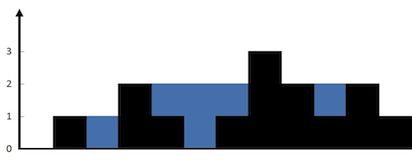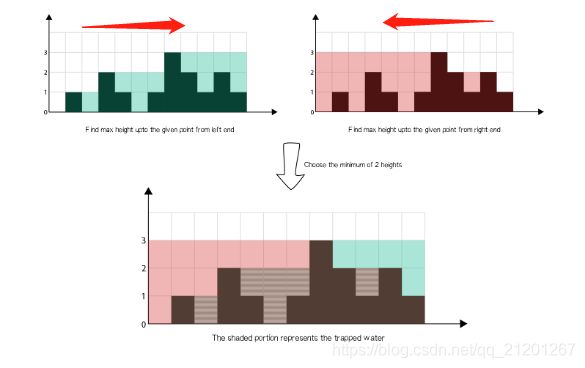- DAY08 算法训练营| 字符串part01
天空的孩子
算法
344.反转字符串-力扣(LeetCode)字符串和数组算法题目思路类似反转字符串是经典双指针法(回忆反转链表,有序数组的平方,三数之和,四数之和)classSolution{public:voidreverseString(vector&s){len=s.length();for(inti=0,j=s.size()-1;iusingnamespacestd;intmain(){strings;/
- LeetCode 643.子数组最大平均数 I
题目:给你一个由n个元素组成的整数数组nums和一个整数k。请你找出平均数最大且长度为k的连续子数组,并输出该最大平均数。任何误差小于10-5的答案都将被视为正确答案。思路:定长滑动窗口入更新出代码:classSolution{publicdoublefindMaxAverage(int[]nums,intk){intn=nums.length;doubleans=Integer.MIN_VALU
- leetcode 643. 子数组最大平均数 I
�粉红豹护体
leetcode
子数组最大平均数I给定n个整数,找出平均数最大且长度为k的连续子数组,并输出该最大平均数。示例1:输入:[1,12,-5,-6,50,3],k=4输出:12.75解释:最大平均数(12-5-6+50)/4=51/4=12.75注意:1result){result=cursum;}}return(double)result/k;}}
- LeetCode1456. 定长子串中元音的最大数目
题目分析本题要求在给定字符串中找到长度为k的子串,使其包含的元音字母(a,e,i,o,u)数量最多。这是一个典型的固定窗口大小的滑动窗口问题。解题思路初始化元音数量:先计算字符串前k个字符中的元音数量作为初始值滑动窗口处理:从第k个字符开始向右移动窗口:加入当前字符:如果是元音,计数加1移除窗口左侧字符:如果是元音,计数减1每次移动后更新最大元音数量元音判断优化:使用逻辑或判断字符是否为元音(简单
- leetcode 1394. 找出数组中的幸运数 简单
圣保罗的大教堂
leetcode哈希leetcode
在整数数组中,如果一个整数的出现频次和它的数值大小相等,我们就称这个整数为「幸运数」。给你一个整数数组arr,请你从中找出并返回一个幸运数。如果数组中存在多个幸运数,只需返回最大的那个。如果数组中不含幸运数,则返回-1。示例1:输入:arr=[2,2,3,4]输出:2解释:数组中唯一的幸运数是2,因为数值2的出现频次也是2。示例2:输入:arr=[1,2,2,3,3,3]输出:3解释:1、2以及3
- leetcode 3304. 找出第 K 个字符 I 简单
圣保罗的大教堂
leetcode字符串leetcode
Alice和Bob正在玩一个游戏。最初,Alice有一个字符串word="a"。给定一个正整数k。现在Bob会要求Alice执行以下操作无限次:将word中的每个字符更改为英文字母表中的下一个字符来生成一个新字符串,并将其追加到原始的word。例如,对"c"进行操作生成"cd",对"zb"进行操作生成"zbac"。在执行足够多的操作后,word中至少存在k个字符,此时返回word中第k个字符的值。
- LeetCode643. 子数组最大平均数 I
题目分析本题要求找出一个长度为k的连续子数组,使其平均值最大。由于平均值由子数组和决定,问题转化为寻找最大子数组和(再除以k)。解题思路滑动窗口技巧:先计算第一个窗口(0到k-1)的元素和。将窗口向右滑动(每次移动一位):减去窗口左侧离开的元素加上窗口右侧新增的元素在滑动过程中记录窗口和的最大值。数学优化:平均值=窗口和/k最大化平均值⇨最大化窗口和最终结果=最大窗口和÷k(注意转换为double
- 暑假算法日记第一天
目标:刷完灵神专题训练算法题单阶段目标:【算法题单】滑动窗口与双指针LeetCode题目:1456.定长子串中元音的最大数目643.子数组最大平均数I1343.大小为K且平均值大于等于阈值的子数组数目2090.半径为k的子数组平均值2379.得到K个黑块的最少涂色次数2841.几乎唯一子数组的最大和其他:今日总结1456.定长子串中元音的最大数目跳转:1456.定长子串中元音的最大数目学习:灵神:
- 准备数仓实习面试中回顾SQL题
zhuiQiuMX
sql
550-game-play-analysis-ivhttps://leetcode.com/problems/game-play-analysis-iv/description/连续两天登录的比率,2025年6月10日星期二,date_sub#编写解决方案,报告在首次登录的第二天再次登录的玩家的比率,四舍五入到小数点后两位。换句话说,你需要计算从首次登录日期开始至少连续两天登录的玩家的数量,然后除
- 算法第16天|继续二叉树:二叉搜索树的最小绝对差、二叉搜索树中的众数、二叉树的最近公共祖先
孟大本事要学习
算法学习算法数据结构
今日总结:1、遇到二叉搜索树就要想到中序遍历是一个有序数组。2、递归的时候如果递归有返回值,一定要思考截止条件返回什么3、最近公共祖先问题:如果当前节点是要寻找的某个节点,可以直接返回:如果二叉树右边没有另一个节点,本身就是最近公共祖先;如果有另一个节点,再往下递归也找不到另一个节点。二叉搜索树的最小绝对差:题目链接:530.二叉搜索树的最小绝对差-力扣(LeetCode)整体思路:1、看到二叉搜
- LeetCode 206. 反转链表
Tanecious.
刷题笔记leetcode链表算法
反转列表206.反转链表解法一解法二206.反转链表题目链接:206.反转链表-力扣(LeetCode)题目描述:给你单链表的头节点head,请你反转链表,并返回反转后的链表。解法一/***Definitionforsingly-linkedlist.*structListNode{*intval;*structListNode*next;*};*/typedefstructListNodeLis
- 代码随想录算法训练营第四十四天|动态规划part11
1143.最长公共子序列题目链接:1143.最长公共子序列-力扣(LeetCode)文章讲解:代码随想录思路:其实就是求两个字符串的最长公共子序列的长度与公共子数组的区别是可以不连续,顺序对就可以状态转移方程不一样定义dp[i][j]表示text1的0到i-1与text2的0到j-1的最长公共子序列的长度text1[i-1]==text2[j-1]dp[i][j]=dp[i-1][j-1]+1否则
- 代码随想录算法训练营第四十五天|动态规划part12
xindafu
算法动态规划
115.不同的子序列题目链接:115.不同的子序列-力扣(LeetCode)文章讲解:代码随想录定义dp[i][j]表示s0-i-1与t0-j-1不同的子序列的个数以s=batgtgt=bag为例子s【4】!=t【3】所以dp[5][4]=dp[4][4]也就是不考虑s[4]继续往后s[5]==t[3]也就是s[5]跟t【3】配对上了batgt与bag配对的个数加上batgt与ba配对的个数dp[
- 代码随想录算法训练营第二十九天|贪心算法part3
xindafu
贪心算法算法
134.加油站题目链接:134.加油站-力扣(LeetCode)文章讲解:代码随想录classSolution{public:intcanCompleteCircuit(vector&gas,vector&cost){vectordiff;for(inti=0;i=0){startindex=i;}sum+=diff[i];if(sum&ratings){intsize=ratings.size(
- 代码随想录算法训练营第三十七天|动态规划part4
1049.最后一块石头的重量II题目链接:1049.最后一块石头的重量II-力扣(LeetCode)文章讲解:代码随想录思路:理解为把石头分成两堆使得两堆的差值尽可能小求这个最小值1理解为往背包里装物品每个物品的重量为石头的重量价值也为石头的价值dp[i][j]表示从0-i块石头往容量为j的包里装的最大价值状态转移:dp[i][j]=max(dp[i-1][j],dp[i-1][j-cost[i]
- 代码随想录算法训练营第二十八天|贪心算法part2
xindafu
贪心算法算法
122.买卖股票的最佳时机II题目链接:122.买卖股票的最佳时机II-力扣(LeetCode)文章讲解:代码随想录思路:这道题的思路很巧妙最终利润是可以分解的假如第0天买入,第3天卖出,那么利润为:prices[3]-prices[0]。相当于(prices[3]-prices[2])+(prices[2]-prices[1])+(prices[1]-prices[0])。此时就是把利润分解为每
- 代码随想录算法训练营第四十六天|动态规划part13
xindafu
算法动态规划
647.回文子串题目链接:647.回文子串-力扣(LeetCode)文章讲解:代码随想录思路:以dp【i】表示以s【i】结尾的回文子串的个数,发现递推公式推导不出来此路·不通以dp【i】【j】表示s【i】到s【j】的回文子串的个数,递推公式也推不出正确dp【i】【j】表示s【i】到s【j】是否为回文串确定递归顺序:dp【i】【j】依赖于dp【i+1】【j-1】因此i从后往前遍历,j从前往后遍历则最
- 1958. 检查操作是否合法
Joyner2018
pythonleetcodepython算法开发语言
判断好线段的合法涂色操作——LeetCode相关题目解析题目描述给定一个8x8的棋盘board,每个格子有三种可能的状态:'.'表示空格'W'表示白色格子'B'表示黑色格子现在你要对一个空格(rMove,cMove)进行涂色操作,颜色为color(白色'W'或黑色'B')。涂色操作的合法性判断规则是:涂色后,(rMove,cMove)这个格子必须是“好线段”的一个端点。“好线段”定义如下:线段是棋
- 查询时候,用case when生成新列,可在end 后为该列取别名
m0_46093829
学习mysqlmysql数据库
查询时候,用casewhen生成新列,可在end后为该列取别名写一段SQL来找到表中每个国家在2019年11月的天气类型。天气类型的定义如下:当weather_state的平均值小于或等于15返回Cold,当weather_state的平均值大于或等于25返回Hot,否则返回Warm。你可以以任意顺序返回你的查询结果。查询结果格式如下所示:来源:力扣(LeetCode)链接:https://lee
- 单调栈总结
qq_43344375
刷题总结数据结构算法数据结构算法leetcode
单调栈总结+Leetcode实例单调栈1.模型识别2.原理3.模板4.例题基础版1)LeetCode739.每日温度2)LeetCode496.下一个更大元素I3)LeetCode503.下一个更大元素II4)LeetCode901.股票价格跨度5)LeetCode1019.链表中的下一个更大节点5.例题提高版1)LeetCode84.柱状图中最大的矩形2)LeetCode42.接雨水3)Leet
- LeetCode 2730. 找到最长的半重复子字符串
算法白菜
算法数据结构leetcode职场和发展java
2730.找到最长的半重复子字符串给你一个下标从0开始的字符串s,这个字符串只包含0到9的数字字符。如果一个字符串t中至多有一对相邻字符是相等的,那么称这个字符串t是半重复的。例如,0010、002020、0123、2002和54944是半重复字符串,而00101022和1101234883不是。请你返回s中最长半重复子字符串的长度。一个子字符串是一个字符串中一段连续非空的字符。示例1:输入:s=
- 二叉树题解——将有序数组转换为二叉搜索树【LeetCode】传统解法
潮_
我的学习记录二叉树篇_刷题笔记算法leetcode数据结构python
108.将有序数组转换为二叉搜索树方法一:中序遍历,总是选择中间位置左边的数字作为根节点选择中间位置左边的数字作为根节点,则根节点的下标为mid=(left+right)/2,此处的除法为整数除法。1.1核心思想分治法:将数组分成左右两部分,递归构建左子树和右子树。高度平衡:通过选择数组的中间元素作为根节点,确保左右子树的节点数尽可能相等,从而保证树的高度平衡。1.2具体步骤递归终止条件:如果左边
- LeetCode——二分查找(704. 二分查找,278. 第一个错误的版本,35. 搜索插入位置)
荒野大飞
leetcode算法散列表
目录练习题目题解704.二分查找278.第一个错误的版本35.搜索插入位置练习题目练习题目题目链接704.二分查找传送门.278.第一个错误的版本传送门.35.搜索插入位置传送门.题解704.二分查找classSolution{public
- 【LeetCode 热题 100】5. 最长回文子串(Python中心扩展法详解)
未名编程
LeetCode热题100详解leetcodepython算法
原题链接:LeetCode5.最长回文子串✨一、题目描述给你一个字符串s,请你找出其中最长的回文子串。回文串是指正着读和反着读都一样的字符串。示例1:输入:s="babad"输出:"bab"解释:"aba"也是一个有效答案。示例2:输入:s="cbbd"输出:"bb"提示:1<=s.length<=1000s仅由数字和英文字母组成
- LeetCode 0035.搜索插入位置【Go】
熠熠晨曦_
Algorithmleetcode
搜索插入位置leetcode35.搜索插入位置题目描述给定一个排序数组和一个目标值,在数组中找到目标值,并返回其索引。如果目标值不存在于数组中,返回它将会被按顺序插入的位置。请必须使用时间复杂度为O(logn)的算法。示例1:输入:nums=[1,3,5,6],target=5输出:2示例2:输入:nums=[1,3,5,6],target=2输出:1示例3:输入:nums=[1,3,5,6],t
- 【Liz的算法日记】Day04 Fizz Buzz
Lizzzo
【Liz的算法日记/•᷅•᷄\୭】算法数据结构leetcode
【Liz的算法日记】04FizzBuzz1.算法题目2.前置知识3.解题思路4.题解代码1.算法题目▸LeetCode412.FizzBuzz给你一个整数n,找出从1到n各个整数的FizzBuzz表示,并用字符串数组answer(下标从1开始)返回结果,其中:answer[i]=="FizzBuzz"如果i同时是3和5的倍数。answer[i]=="Fizz"如果i是3的倍数。answer[i]=
- 算法学习笔记:7.Dijkstra 算法——从原理到实战,涵盖 LeetCode 与考研 408 例题
在计算机科学领域,图论算法一直占据着重要地位,其中Dijkstra算法作为求解单源最短路径问题的经典算法,被广泛应用于路径规划、网络路由等多个场景。无论是算法竞赛、实际项目开发,还是计算机考研408的备考,Dijkstra算法都是必须掌握的核心内容。一、Dijkstra算法的基本概念Dijkstra算法是由荷兰计算机科学家EdsgerW.Dijkstra在1956年提出的,用于解决带权有向图或无向
- LeetCode:199. 二叉树的右视图(C++带详细注释)
Axe涛
Leetcode题目二叉树队列数据结构leetcode算法
LeetCode:199.二叉树的右视图(C++带详细注释)/***Definitionforabinarytreenode.*structTreeNode{*intval;*TreeNode*left;*TreeNode*right;*TreeNode(intx):val(x),left(NULL),right(NULL){}*};*/classSolution{public:vectorrig
- 力扣199-二叉树的右视图-C++
TLJava^v^
数据结构#力扣-C++c++力扣二叉树右视图层次遍历
一、运行结果二、题目给定一个二叉树的根节点root,想象自己站在它的右侧,按照从顶部到底部的顺序,返回从右侧所能看到的节点值。示例1:输入:[1,2,3,null,5,null,4]输出:[1,3,4]示例2:输入:[1,null,3]输出:[1,3]示例3:输入:[]输出:[]来源:力扣(LeetCode)链接:https://leetcode-cn.com/problems/binary-tr
- LeetCode.283移动零
莫魂魂
数据结构与算法算法
题目链接:283.移动零-力扣(LeetCode)题目描述:给定一个数组nums,编写一个函数将所有0移动到数组的末尾,同时保持非零元素的相对顺序。请注意,必须在不复制数组的情况下原地对数组进行操作。示例1:输入:nums=[0,1,0,3,12]输出:[1,3,12,0,0]示例2:输入:nums=[0]输出:[0]提示:1dest,说明中间有0,把非零数向前移动,把0向后挤。}}
- 对股票分析时要注意哪些主要因素?
会飞的奇葩猪
股票 分析 云掌股吧
众所周知,对散户投资者来说,股票技术分析是应战股市的核心武器,想学好股票的技术分析一定要知道哪些是重点学习的,其实非常简单,我们只要记住三个要素:成交量、价格趋势、振荡指标。
一、成交量
大盘的成交量状态。成交量大说明市场的获利机会较多,成交量小说明市场的获利机会较少。当沪市的成交量超过150亿时是强市市场状态,运用技术找综合买点较准;
- 【Scala十八】视图界定与上下文界定
bit1129
scala
Context Bound,上下文界定,是Scala为隐式参数引入的一种语法糖,使得隐式转换的编码更加简洁。
隐式参数
首先引入一个泛型函数max,用于取a和b的最大值
def max[T](a: T, b: T) = {
if (a > b) a else b
}
因为T是未知类型,只有运行时才会代入真正的类型,因此调用a >
- C语言的分支——Object-C程序设计阅读有感
darkblue086
applec框架cocoa
自从1972年贝尔实验室Dennis Ritchie开发了C语言,C语言已经有了很多版本和实现,从Borland到microsoft还是GNU、Apple都提供了不同时代的多种选择,我们知道C语言是基于Thompson开发的B语言的,Object-C是以SmallTalk-80为基础的。和C++不同的是,Object C并不是C的超集,因为有很多特性与C是不同的。
Object-C程序设计这本书
- 去除浏览器对表单值的记忆
周凡杨
html记忆autocompleteform浏览
&n
- java的树形通讯录
g21121
java
最近用到企业通讯录,虽然以前也开发过,但是用的是jsf,拼成的树形,及其笨重和难维护。后来就想到直接生成json格式字符串,页面上也好展现。
// 首先取出每个部门的联系人
for (int i = 0; i < depList.size(); i++) {
List<Contacts> list = getContactList(depList.get(i
- Nginx安装部署
510888780
nginxlinux
Nginx ("engine x") 是一个高性能的 HTTP 和 反向代理 服务器,也是一个 IMAP/POP3/SMTP 代理服务器。 Nginx 是由 Igor Sysoev 为俄罗斯访问量第二的 Rambler.ru 站点开发的,第一个公开版本0.1.0发布于2004年10月4日。其将源代码以类BSD许可证的形式发布,因它的稳定性、丰富的功能集、示例配置文件和低系统资源
- java servelet异步处理请求
墙头上一根草
java异步返回servlet
servlet3.0以后支持异步处理请求,具体是使用AsyncContext ,包装httpservletRequest以及httpservletResponse具有异步的功能,
final AsyncContext ac = request.startAsync(request, response);
ac.s
- 我的spring学习笔记8-Spring中Bean的实例化
aijuans
Spring 3
在Spring中要实例化一个Bean有几种方法:
1、最常用的(普通方法)
<bean id="myBean" class="www.6e6.org.MyBean" />
使用这样方法,按Spring就会使用Bean的默认构造方法,也就是把没有参数的构造方法来建立Bean实例。
(有构造方法的下个文细说)
2、还
- 为Mysql创建最优的索引
annan211
mysql索引
索引对于良好的性能非常关键,尤其是当数据规模越来越大的时候,索引的对性能的影响越发重要。
索引经常会被误解甚至忽略,而且经常被糟糕的设计。
索引优化应该是对查询性能优化最有效的手段了,索引能够轻易将查询性能提高几个数量级,最优的索引会比
较好的索引性能要好2个数量级。
1 索引的类型
(1) B-Tree
不出意外,这里提到的索引都是指 B-
- 日期函数
百合不是茶
oraclesql日期函数查询
ORACLE日期时间函数大全
TO_DATE格式(以时间:2007-11-02 13:45:25为例)
Year:
yy two digits 两位年 显示值:07
yyy three digits 三位年 显示值:007
- 线程优先级
bijian1013
javathread多线程java多线程
多线程运行时需要定义线程运行的先后顺序。
线程优先级是用数字表示,数字越大线程优先级越高,取值在1到10,默认优先级为5。
实例:
package com.bijian.study;
/**
* 因为在代码段当中把线程B的优先级设置高于线程A,所以运行结果先执行线程B的run()方法后再执行线程A的run()方法
* 但在实际中,JAVA的优先级不准,强烈不建议用此方法来控制执
- 适配器模式和代理模式的区别
bijian1013
java设计模式
一.简介 适配器模式:适配器模式(英语:adapter pattern)有时候也称包装样式或者包装。将一个类的接口转接成用户所期待的。一个适配使得因接口不兼容而不能在一起工作的类工作在一起,做法是将类别自己的接口包裹在一个已存在的类中。 &nbs
- 【持久化框架MyBatis3三】MyBatis3 SQL映射配置文件
bit1129
Mybatis3
SQL映射配置文件一方面类似于Hibernate的映射配置文件,通过定义实体与关系表的列之间的对应关系。另一方面使用<select>,<insert>,<delete>,<update>元素定义增删改查的SQL语句,
这些元素包含三方面内容
1. 要执行的SQL语句
2. SQL语句的入参,比如查询条件
3. SQL语句的返回结果
- oracle大数据表复制备份个人经验
bitcarter
oracle大表备份大表数据复制
前提:
数据库仓库A(就拿oracle11g为例)中有两个用户user1和user2,现在有user1中有表ldm_table1,且表ldm_table1有数据5千万以上,ldm_table1中的数据是从其他库B(数据源)中抽取过来的,前期业务理解不够或者需求有变,数据有变动需要重新从B中抽取数据到A库表ldm_table1中。
- HTTP加速器varnish安装小记
ronin47
http varnish 加速
上午共享的那个varnish安装手册,个人看了下,有点不知所云,好吧~看来还是先安装玩玩!
苦逼公司服务器没法连外网,不能用什么wget或yum命令直接下载安装,每每看到别人博客贴出的在线安装代码时,总有一股羡慕嫉妒“恨”冒了出来。。。好吧,既然没法上外网,那只能麻烦点通过下载源码来编译安装了!
Varnish 3.0.4下载地址: http://repo.varnish-cache.org/
- java-73-输入一个字符串,输出该字符串中对称的子字符串的最大长度
bylijinnan
java
public class LongestSymmtricalLength {
/*
* Q75题目:输入一个字符串,输出该字符串中对称的子字符串的最大长度。
* 比如输入字符串“google”,由于该字符串里最长的对称子字符串是“goog”,因此输出4。
*/
public static void main(String[] args) {
Str
- 学习编程的一点感想
Cb123456
编程感想Gis
写点感想,总结一些,也顺便激励一些自己.现在就是复习阶段,也做做项目.
本专业是GIS专业,当初觉得本专业太水,靠这个会活不下去的,所以就报了培训班。学习的时候,进入状态很慢,而且当初进去的时候,已经上到Java高级阶段了,所以.....,呵呵,之后有点感觉了,不过,还是不好好写代码,还眼高手低的,有
- [能源与安全]美国与中国
comsci
能源
现在有一个局面:地球上的石油只剩下N桶,这些油只够让中国和美国这两个国家中的一个顺利过渡到宇宙时代,但是如果这两个国家为争夺这些石油而发生战争,其结果是两个国家都无法平稳过渡到宇宙时代。。。。而且在战争中,剩下的石油也会被快速消耗在战争中,结果是两败俱伤。。。
在这个大
- SEMI-JOIN执行计划突然变成HASH JOIN了 的原因分析
cwqcwqmax9
oracle
甲说:
A B两个表总数据量都很大,在百万以上。
idx1 idx2字段表示是索引字段
A B 两表上都有
col1字段表示普通字段
select xxx from A
where A.idx1 between mmm and nnn
and exists (select 1 from B where B.idx2 =
- SpringMVC-ajax返回值乱码解决方案
dashuaifu
AjaxspringMVCresponse中文乱码
SpringMVC-ajax返回值乱码解决方案
一:(自己总结,测试过可行)
ajax返回如果含有中文汉字,则使用:(如下例:)
@RequestMapping(value="/xxx.do") public @ResponseBody void getPunishReasonB
- Linux系统中查看日志的常用命令
dcj3sjt126com
OS
因为在日常的工作中,出问题的时候查看日志是每个管理员的习惯,作为初学者,为了以后的需要,我今天将下面这些查看命令共享给各位
cat
tail -f
日 志 文 件 说 明
/var/log/message 系统启动后的信息和错误日志,是Red Hat Linux中最常用的日志之一
/var/log/secure 与安全相关的日志信息
/var/log/maillog 与邮件相关的日志信
- [应用结构]应用
dcj3sjt126com
PHPyii2
应用主体
应用主体是管理 Yii 应用系统整体结构和生命周期的对象。 每个Yii应用系统只能包含一个应用主体,应用主体在 入口脚本中创建并能通过表达式 \Yii::$app 全局范围内访问。
补充: 当我们说"一个应用",它可能是一个应用主体对象,也可能是一个应用系统,是根据上下文来决定[译:中文为避免歧义,Application翻译为应
- assertThat用法
eksliang
JUnitassertThat
junit4.0 assertThat用法
一般匹配符1、assertThat( testedNumber, allOf( greaterThan(8), lessThan(16) ) );
注释: allOf匹配符表明如果接下来的所有条件必须都成立测试才通过,相当于“与”(&&)
2、assertThat( testedNumber, anyOf( g
- android点滴2
gundumw100
应用服务器android网络应用OSHTC
如何让Drawable绕着中心旋转?
Animation a = new RotateAnimation(0.0f, 360.0f,
Animation.RELATIVE_TO_SELF, 0.5f, Animation.RELATIVE_TO_SELF,0.5f);
a.setRepeatCount(-1);
a.setDuration(1000);
如何控制Andro
- 超简洁的CSS下拉菜单
ini
htmlWeb工作html5css
效果体验:http://hovertree.com/texiao/css/3.htmHTML文件:
<!DOCTYPE html>
<html xmlns="http://www.w3.org/1999/xhtml">
<head>
<title>简洁的HTML+CSS下拉菜单-HoverTree</title>
- kafka consumer防止数据丢失
kane_xie
kafkaoffset commit
kafka最初是被LinkedIn设计用来处理log的分布式消息系统,因此它的着眼点不在数据的安全性(log偶尔丢几条无所谓),换句话说kafka并不能完全保证数据不丢失。
尽管kafka官网声称能够保证at-least-once,但如果consumer进程数小于partition_num,这个结论不一定成立。
考虑这样一个case,partiton_num=2
- @Repository、@Service、@Controller 和 @Component
mhtbbx
DAOspringbeanprototype
@Repository、@Service、@Controller 和 @Component 将类标识为Bean
Spring 自 2.0 版本开始,陆续引入了一些注解用于简化 Spring 的开发。@Repository注解便属于最先引入的一批,它用于将数据访问层 (DAO 层 ) 的类标识为 Spring Bean。具体只需将该注解标注在 DAO类上即可。同时,为了让 Spring 能够扫描类
- java 多线程高并发读写控制 误区
qifeifei
java thread
先看一下下面的错误代码,对写加了synchronized控制,保证了写的安全,但是问题在哪里呢?
public class testTh7 {
private String data;
public String read(){
System.out.println(Thread.currentThread().getName() + "read data "
- mongodb replica set(副本集)设置步骤
tcrct
javamongodb
网上已经有一大堆的设置步骤的了,根据我遇到的问题,整理一下,如下:
首先先去下载一个mongodb最新版,目前最新版应该是2.6
cd /usr/local/bin
wget http://fastdl.mongodb.org/linux/mongodb-linux-x86_64-2.6.0.tgz
tar -zxvf mongodb-linux-x86_64-2.6.0.t
- rust学习笔记
wudixiaotie
学习笔记
1.rust里绑定变量是let,默认绑定了的变量是不可更改的,所以如果想让变量可变就要加上mut。
let x = 1; let mut y = 2;
2.match 相当于erlang中的case,但是case的每一项后都是分号,但是rust的match却是逗号。
3.match 的每一项最后都要加逗号,但是最后一项不加也不会报错,所有结尾加逗号的用法都是类似。
4.每个语句结尾都要加分


